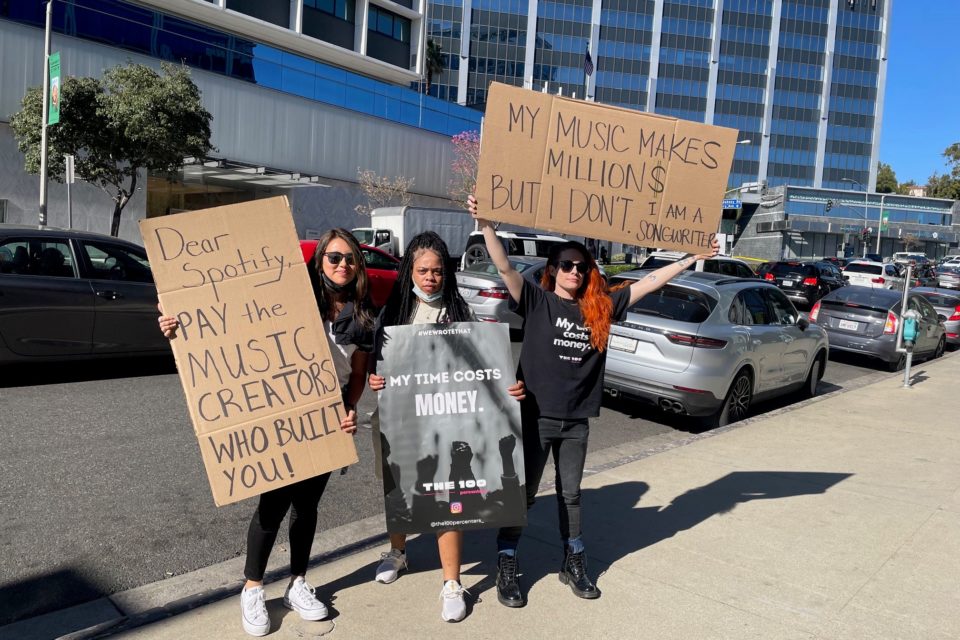A few weeks back, you probably heard about a Spotify showdown of sorts. An ornery rock elder and a few of his peers made a show of pulling their catalogs from the streaming platform over COVID misinformation on Joe Rogan’s podcast, which has an exclusive deal with Spotify.
That is hardly the only point of contention between music makers and Spotify, though. Compensation — how much streaming revenue goes to the folks behind the music being streamed — that’s a big topic, too. A songwriters’ advocacy group protested outside the company’s LA offices on Monday, and Chris Willman was there reporting on it for Variety. He shared what he saw with WNXP.
Jewly Hight: Chris, can you paint a picture for us of what the scene was like? Where was this protest? How large of a turnout was there and who did you see in the crowd?
Chris Willman: This group is The 100 Percenters that formed this demonstration, and they were out on the street, on Sunset Boulevard and just holding up signs and getting the honks of passersby, and, of course, addressing the media like myself.
They were doing it in front of the former Spotify offices. So it was, you know, largely a symbolic protest, because there were no Spotify employees coming in and out of the building. They wanted to launch the demonstration in front of where Spotify came from. And then they’re going to have another march in the month of March where they’re going to meet and march from Spotify’s current headquarters in downtown LA.
There were maybe 30 people there, not a huge turnout. Some of the signs were probably a little too long to really be read by cars coming by. Here’s one: “Dear Spotify re-allocate your billion dollar marketing budget to the music creators who built you.” Other signs [said], “No budget, no bops,” and, “We wrote the music that you fall in love to! #Pay writers.”
JH: Did you speak with anyone there, and what do they have to say?
CW: The woman who leads The 100 Percenters, I spoke to her and some others. Her name is Tiffany Red. She’s a singer-songwriter in her mid-thirties. She’s written songs for Zendaya, Jennifer Hudson, Jason Derulo.
And it’s significant that this particular group, The 100 Percenters, is focused on the songwriters who are BIPOC. You know, I’ve gone to a lot of songwriters meetings where they’re strategizing, and it’s a pretty white crowd. So it’s a little bit different to pull up to this protest and see mostly people of color, especially women of color, who seem to be the foundation.
Tiffany Red started this group in July of 2020, and she went viral at the time because she put up a post about how little money she’d gotten for writing this K-pop hit “Boss.”
And a lot of these folks are trying to get it across that they can’t pay their bills, or they’re barely paying their bills, and that they’re lower middle-class.
Another person who was there was a songwriter named Kaydence, and she’s written a ton of songs that everyone would know, like Ariana Grande’s, “Thank U, Next.” She’s a member of the board in the 100 Percenters. She said, what I thought was interesting, was that this protest was really for the public. They feel that people in the industry get it now. They’ve taken their sides. But the public still thinks that songwriters are rich, or well off at least.
JH: Why is Spotify one of The 100 Percenters big targets at the moment?
CW: Tiffany Red said it’s because, “Spotify is one of the main DSPs that appealed our pay raise of 44 percent,” which is what the Copyright Royalty Board came up with. And now most of the DSPs, with the exception of Tidal, are fighting that. The fact that Spotify says, “No, that’s too much,” while they’re giving $200 million to Joe Rogan has not gone over well. They’re happy to get the attention that’s come about as a result of Joe Rogan, but they have kind of a slogan: “Come for the culture war and stay for the publishing revolution.”
JH: You mentioned that the 100 Percenters are already planning their next march. Do you think we will see this kind of action replicated in any other music industry hubs? I’m thinking, particularly of Nashville, because I can’t think of a time when we have seen this kind of demonstration outside of corporate office, even a vacated one, in Nashville.
CW: Well, it’ll be interesting to see if it might spread in Nashville, because it’s really just getting started here. I mean, the idea of protesting in the streets is not something that’s popped up so far in these streaming and royalty wars. So whether it spreads to Nashville, you know, people are maybe a little more nervous about upsetting the apple cart in a smaller town. [But] it’s hard to find people who want to defend all the DSPs trying to appeal what seems like a minimal raise for songwriters.

